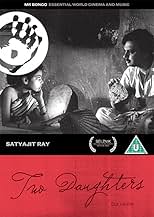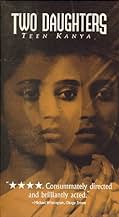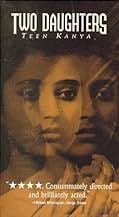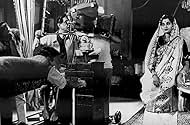Ajouter une intrigue dans votre langueBased on popular Indian stories of the great writer Rabindranath Tagore, these short films reveal definitive moments in the lives of three young girls.Based on popular Indian stories of the great writer Rabindranath Tagore, these short films reveal definitive moments in the lives of three young girls.Based on popular Indian stories of the great writer Rabindranath Tagore, these short films reveal definitive moments in the lives of three young girls.
- Director
- Writers
- Stars
- Prix
- 4 victoires au total
- Nandal (segment "Postmaster")
- (as Anil Chattopadhyay)
- Ratan (segment "Postmaster")
- (as Chandana Bandyopadhyay)
- Mrinmoyee (segment "Samapti")
- (as Aparna Das Gupta)
- Jogmaya (segment "Samapti")
- (as Sita Mukhopadhyay)
- Bishey (segment "Postmaster")
- (as Nripati Chattopadhyay)
- Phanibhushan Saha (segment "Monihara")
- (as Kali Bannerji)
- Schoolmaster and narrator (segment "Monihara")
- (as Gobinda Chakrabarti)
- Amulya (segment "Samapti")
- (as Soumitra Chattopadhyay)
Avis en vedette
Second entry about an upper middle class woman's marital problems is so dull I wish it were half the length of the first.
Third entry is the best, by far. A triangle between a too controlling mother, her spoiled son, and the "headstrong, crazy" girl (read a woman with a mind of her own) with whom the son is infatuated, the story is well told by Ray with a beguiling combination of comedy and tragedy. And the ending, where both the son and the girl learn to grow up, in their various ways, if they wish to salvage their marriage, is most satisfying.
First film: B Second Film: C Third Film: A
Ergo, let's give it a B.
Without any superior technology, the acting and the depiction of the actors and actresses, and the director, respectively, have made it very real. I am giving it a seven because of my own taste. This piece is from the olden days, and for that reason, the fluidity is missing. But, I have that much sense to call it a MASTERPIECE.
The Postman is the better of the two stories. Not giving away the plot, this movie had one of the most heart-wrenching scenes in cinema. The simple, but powerful way Ray pulls his quiet films together at their end makes these quiet films very memorable. Sampati drags out somewhat longer, but has a powerful climax of its own. After years, these two movies have stuck in my memory. I would recommend them to anyone.
Le saviez-vous
- AnecdotesThe "Monihara" segment of the film was dropped for the first international release because subtitles could not be finished in time due to budgeting constraints.
- Citations
Ratan (segment "Postmaster"): I can sing too.
Nandal (segment "Postmaster"): Is that so?
Ratan (segment "Postmaster"): I can sing now if you like.
[singing]
Ratan (segment "Postmaster"): In the lonely forest, A little girl is crying, Calling for you, Tears drop from her eyes, In the lonely forest, A little girl is crying, Calling for you, Tears drop from her eyes, With a trembling voice, She keeps calling out, With a trembling voice, She keeps calling out, The girl is lost in the forest, And nobody hears her, Nobody answers her
- Autres versionsOriginal Indian version includes three episodes and runs 171 minutes; the version released in the USA (retitled "The Two Daughters") features only two episodes and is 114 minutes long.
- ConnexionsFeatures Conversation with James Ivory (2010)
Meilleurs choix
- How long is Three Daughters?Propulsé par Alexa
Détails
Box-office
- Brut – États-Unis et Canada
- 81 200 $ US
- Durée2 heures 53 minutes
- Couleur
- Mixage
- Rapport de forme
- 1.33 : 1
Contribuer à cette page






















